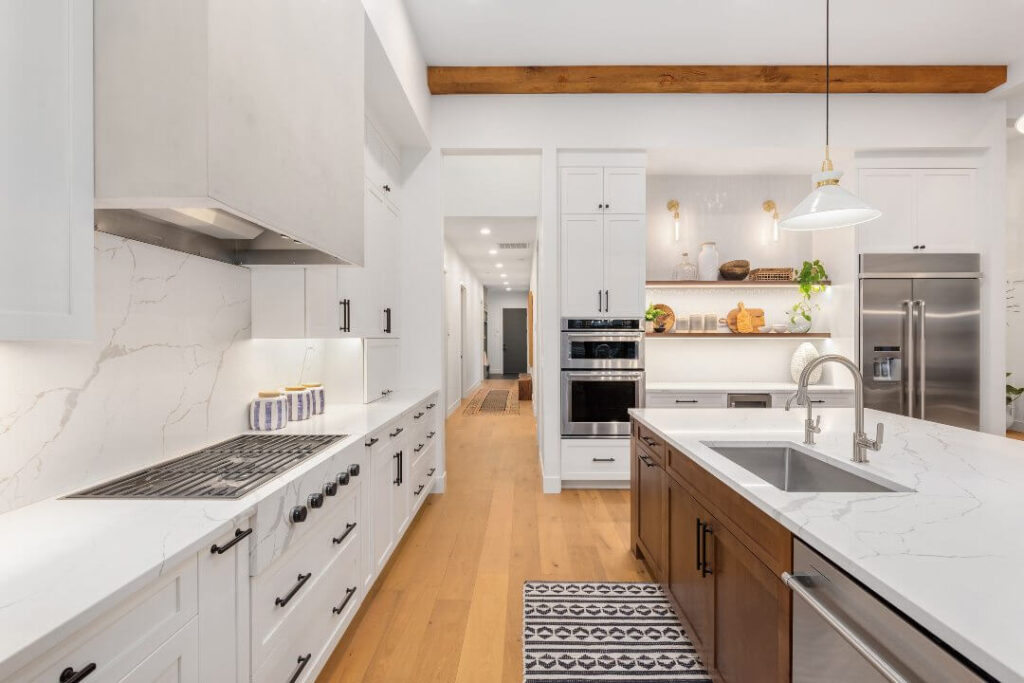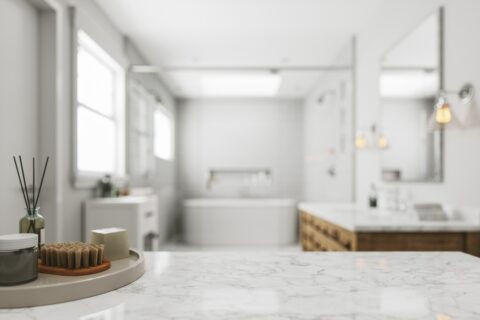Pros and Cons of Marble vs. Quartz Countertops
Choosing between marble and quartz countertops for your kitchen or bathroom can seem overwhelming at first. After all, each material offers a unique blend of aesthetics, durability, and maintenance requirements. Take a closer look at marble vs. quartz countertops to help you make an informed decision.
What are Marble Countertops?
Marble has been a symbol of luxury and elegance for centuries. The naturally occurring stone is characterized by its unique veining, with colors ranging from pristine white and smoky grey to warm beige and rich black. Every marble countertop is one-of-a-kind, offering a distinct visual appeal that’s difficult to duplicate.
Marble Countertop Pros and Cons
Marble countertops add these benefits to any space:
- Beauty: The natural veining and wide range of color choices make marble a versatile addition to any home, especially those with traditional interiors.
- Heat resistance: Marble countertops are suitable for kitchens as they are quite heat resistant.
- Increased home value: Thanks to their luxurious appearance and other benefits, installing marble countertops can increase your home’s value.
Before installing marble countertops, consider these potential challenges:
- Maintenance: Marble is very soft and porous compared to other stones, making it susceptible to stains. Regular sealing is necessary to maintain its pristine look.
- Scratches: Marble can be scratched by sharp objects, potentially detracting from its visual appeal.
- Etching: Acidic materials like lemon juice and vinegar can etch polished marble, causing dull spots.
What are Quartz Countertops?
Unlike marble, quartz countertops are engineered stone products. They typically comprise 90 to 95 percent ground quartz combined with resins to bind it and pigments to give it color. The result is a nonporous, stain-resistant material that is as durable as it is beautiful.
Quartz Countertop Pros and Cons
Here’s a look at what quartz has to offer:
- Versatility: As a manufactured product, quartz countertops come in nearly any color and pattern imaginable.
- Stain resistance: Nonporous quartz is more resistant to staining than many natural stones, including marble.
- Low maintenance: Quartz countertops are easy to clean and don’t require sealing.
Despite these advantages, quartz has a few drawbacks:
- Lower heat resistance: Quartz is less heat resistant than marble, so use heat pads or trivets to protect the surface.
- Less traditional: While quartz can be manufactured to mimic the appearance of traditional marble, some favor the authenticity of natural stone.
- Potential for UV damage: Exposure to sunlight can cause bright-colored quartz to fade.

The Bottom Line
Your choice between marble and quartz countertops largely depends on your lifestyle and aesthetic preferences. Marble offers unparalleled natural beauty and elegance but requires a fair bit of maintenance, while quartz provides robust durability and a modern-leaning aesthetic.
At Rock Solid Custom Granite, we pride ourselves on guiding clients through these critical decisions, ensuring the best countertop choice for your needs. Call us today at (720) 344-7625 or contact us online for more information about your countertop options or to request an installation estimate.


